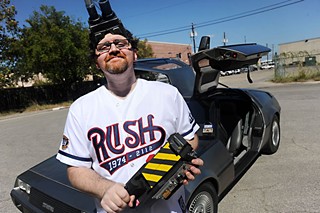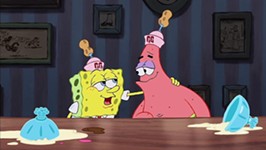AFF2012: Attacking the Nitty Gritty Panel
Should psychedelics fail...
By Kimberley Jones, 2:35PM, Sun. Oct. 21, 2012
In her intro to Sunday panel "Attacking the Nitty Gritty: How to Best Prepare Before Writing Your Script," moderator Sarah Bird ran through the tools screenwriters turn to in gearing up to write, such as Post-It notes or step outlines. On the more experimental end, she joked, "Some avail themselves of powerful hallucinogens."
Inadvisable, probably, but a concrete option in what is an historically difficult concept to pin down: How do you prepare to write? Where does the inspiration come from? When do you know you're ready to start?
The word "pain" came up regularly to describe the process of translating an idea into script form among the four panelists: Brian McDonald (whose expansive credits include creature shop FX work, the storytelling craft book Invisible Ink, story advising at Pixar, and writing on Hoarders); industry vet Michael B. Druxman (Dillinger and Capone), newly moved to Austin; Brin Hill (scripter of newly released film Won't Back Down, about which, he said, he has "mixed feelings"); and Austin's Ernie Cline (Fanboys, Ready Player One).
Research seemed to be an integral part of every panelist's process – especially as a way of delaying the actual page-one-writing – but they had different approaches. Cline laughed that, in preparing to write his bestselling pop-cultured obsessed novel Ready Player One, which he's now adapting for Warner Bros., "I could play video games and watch movies and tell myself I was doing research." He also said he tended to carry ideas around in his head for years, just letting them marinate, a sentiment repeated by all the panelists.
McDonald spoke of "hard" research – as in, in his cheeky example, "When was the War of 1812? So I look that up" – and "soft" research – meaning intense immersion in the material so that when the writer begins to write, he's armed himself with "a general sort of wash of information."
Hill made the case for real-world immersion, citing a colorful family (a bookie uncle, ex-con cousins) who provided plenty of material if Hill just sat back and listened. He also recalled his days in film school when he would, "get on the train, ride the train to Coney Island, and shut up and listen." He'd write down observations, snatches of dialogue and filled "tomes of composition books" that he still on occasion turns back to for material.
There was, to be expected, dissent regarding methodology. Drawing on his days working in a creature shop, McDonald likened the unseen but integral wire armature underneath the creature-creations to a script's theme: "Your theme is the thing that holds everything up."
Riffing on how the three-act structure "mirrors human speech… proposal, argument, conclusion," with the theme a vital part in each of the steps, McDonald continued, "A theme is a sentence, not a word. 'Revenge' is not a theme, you can't prove it. 'Love' is not a theme, you can't prove it."
Druxman disagreed: "I guess I'm a maverick because I try not to think about theme. I try not to think too hard about what I'm doing." He recalled being told by a friend once about plot points, which briefly threw him off his game: "'Oh my god, I didn't hit the catalyst on p. 12!'" Dismissing the three-act structure in general and the notion of written prep specifically, Druxman said, "I don't outline. I'm a storyteller."
That pretty much cued the panel's shift away from the "nitty gritty" and into a story swap of all the ways the studios had mishandled these particular storytellers. Cline spoke of Fanboys' particularly long slog to screen (read about it here), Druxman and Hill recalled beloved pictures mangled along the way, and Hill got a laugh describing what L.A. players are looking for: "Every time I go into the agency, they tell me to write Taken." They were good stories, from lively storytellers, but still: For a panel billed as craft-oriented, it marked a frustrating steer off-course.
A note to readers: Bold and uncensored, The Austin Chronicle has been Austin’s independent news source for over 40 years, expressing the community’s political and environmental concerns and supporting its active cultural scene. Now more than ever, we need your support to continue supplying Austin with independent, free press. If real news is important to you, please consider making a donation of $5, $10 or whatever you can afford, to help keep our journalism on stands.
Katherine McNevins, Sept. 9, 2021
Richard Whittaker, Sept. 12, 2018
June 28, 2024
June 14, 2024
Austin Film Festival, aff2012, Ernie Cline, Sarah Bird, Michael Druxman, Brian McDonald, Brin Hill











